Ngozi James
The International Monetary Fund, IMF, has warned that worsening insecurity in Nigeria pose a significant risk to the country’s economic outlook.
IMF said this in its report on the latest Article IV consultation with Nigeria during which its team of economists visited the country to assess and discuss economic and financial developments with the authorities
According to the global lender, in spite of the management of the pandemic, the outlook remains subject to significant risks, including from the pandemic trajectory, and oil price uncertainty.
It recognised that the Nigerian economy was recovering from a historic downturn benefitting from government policy support, rising oil prices and international financial assistance.
“After registering a historic deficit in 2020, the current account improved in 2021 and gross foreign exchange reserves have improved, supported by the IMF’s Special Drawing Rights (SDR) allocation and Eurobond placements in September 2021.
“Notwithstanding the authorities’ proactive approach to contain COVID-19 infection rates and fatalities and the recent growth improvement, socio-economic conditions remain a challenge.
IMF said the outlook faces balanced risks as on the downside, low vaccination rates expose Nigeria to future pandemic waves and new variants, while higher debt service to government revenues pose risks for fiscal sustainability.
It added that a worsening of violence and insecurity could also derail the recovery.
“On the upside, the non-oil sector could be stronger, benefitting from its recent growth momentum, supportive credit policies, and higher production from the new Dangote refinery.
“Nigeria’s ratification of the African Continental Free Trade Agreement (AfCFTA) could also yield a positive boost to the non-oil sector while oil production could rebound, supported by the more generous terms of the Petroleum Industry Act,” it said.
IMF, however, emphasised the need for major reforms in the fiscal, exchange rate, trade and governance areas to lift long-term, inclusive growth.
On exchange rate, the directors welcomed the removal of the official exchange rate and recommended further measures towards a unified and market-clearing exchange rate.
This, they said, was to help strengthen Nigeria’s external position, taking advantage of the current favorable conditions.
They also noted that exchange rate reforms should be accompanied by macroeconomic policies to contain inflation, structural reforms to improve transparency and governance, and clear communications regarding exchange rate policy.
The directors highlighted the urgency of fiscal consolidation to create policy space and reduce debt sustainability risks.

